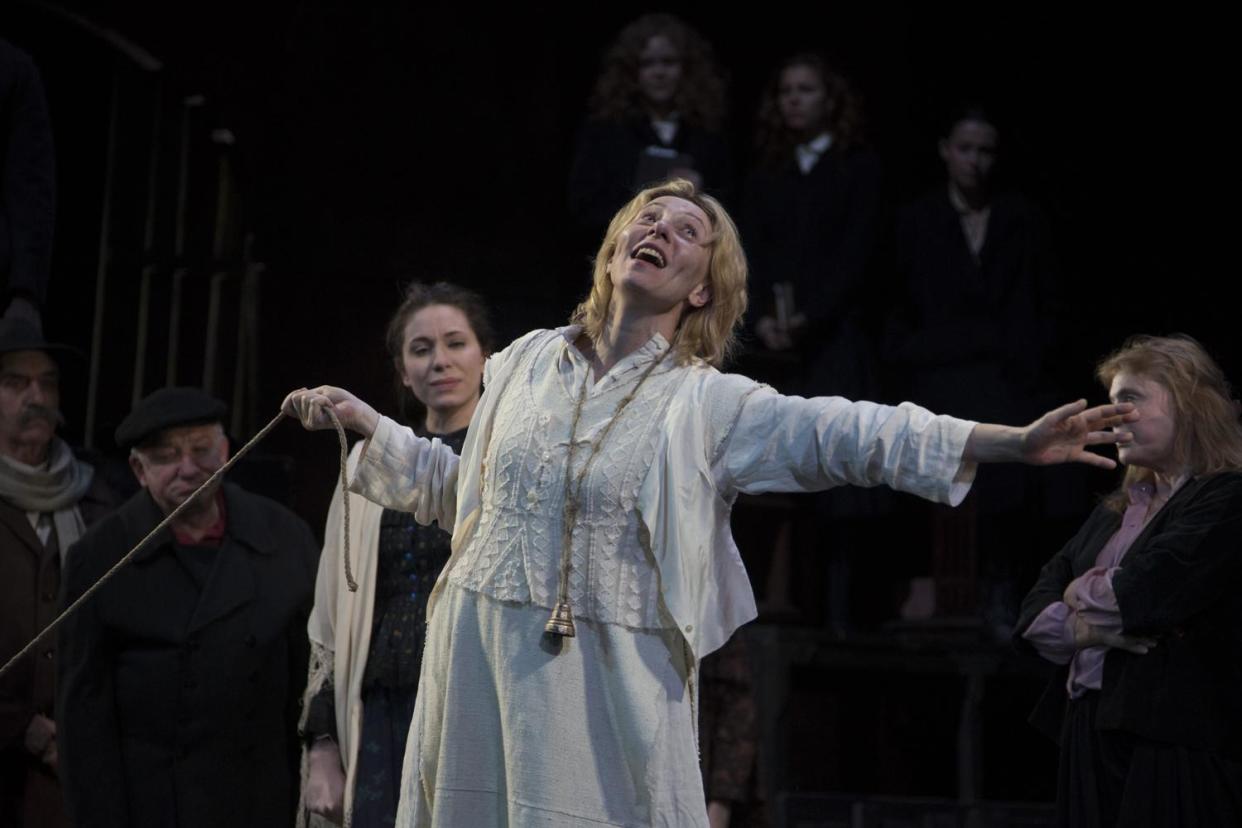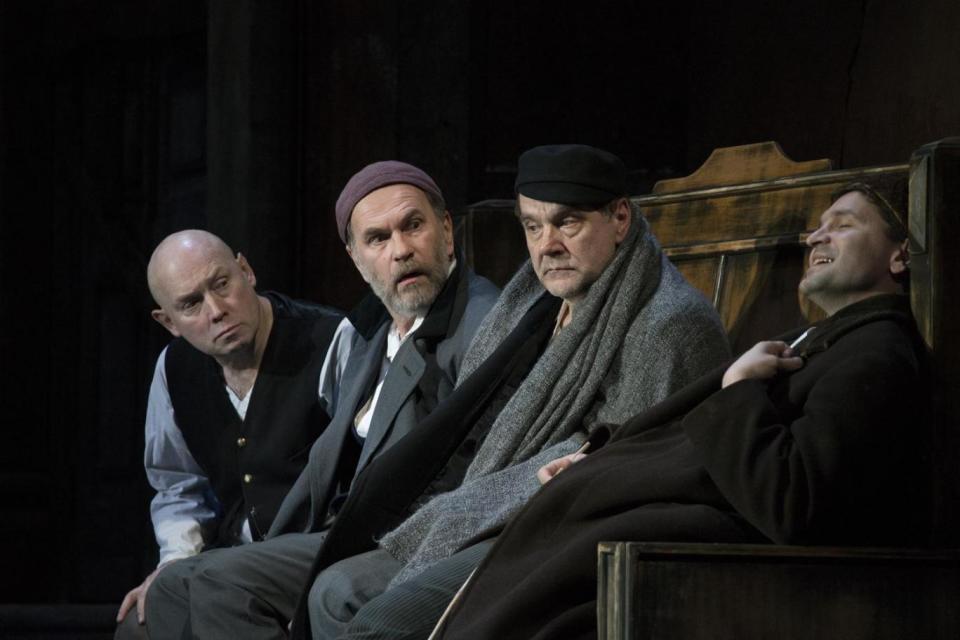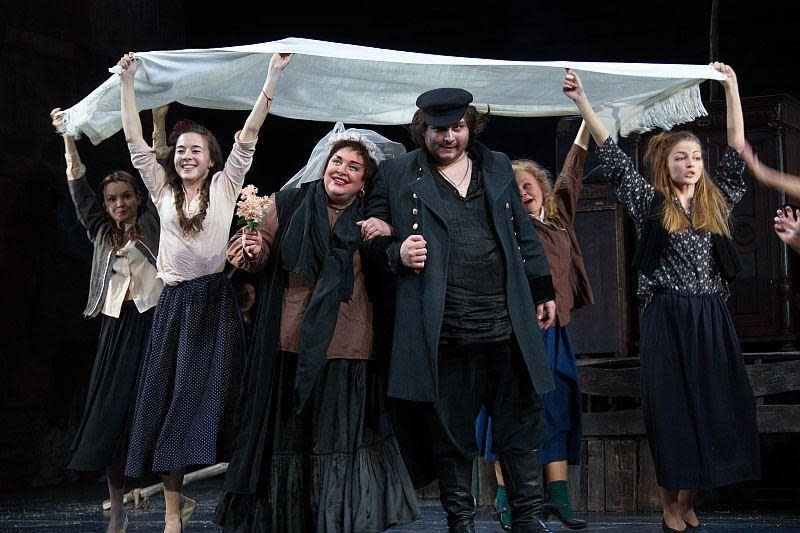From Russia with love: Moscow's Vakhtangov Theatre comes to the Barbican

There is a timeliness to the Vakhtangov Theatre’s forthcoming visit to London.
The much-lauded company, founded in 1920 as an offshoot of Stanislavsky’s Moscow Art Theatre, is strengthening cultural bridges.
The Vakhtangov first visited the capital with an Uncle Vanya at the Noël Coward Theatre in 2012 that the Independent praised for its “blackly comic abandon”, and then with a version of Pushkin’s Eugene Onegin at the Barbican in 2015, which the Guardian pronounced “dazzling”.
This time, the company’s Lithuanian artistic director Rimas Tuminas is bringing a new play to the Barbican. Smile Upon Us, Lord is a moving and evocative adaptation from the novels of Tuminas’s countryman Grigory Kanovich, about the journey of three elderly Jewish men to Vilnius before the First World War.
“It is not just a Jewish story, it is universal,” says Oksana Nemchuk, the Ukrainian producer behind the company’s international tours. “This production is about many things: about children, life, about humanity. Everyone will find something for themselves. We are all on a journey and it’s important to have a feeling for other people.” Again, with prejudice in general, and anti-Semitism in particular, resurgent worldwide, this feels timely.

The show’s three main characters are spurred to leave their shtetl for different reasons. The stone-cutter, Efraim, hears that his son has been arrested after shooting the governor in the capital. The water-carrier, Schmuel, has dreamed that his son has returned in glory from America, laden with gold pocket watches to hand out to friends and family. And Avner, who lost his family and his store in a fire and has become a beggar, just wants to go along for the ride. The trio are played by Sergey Makovetskiy, Evgeny Knyazev and Viktor Sukhorukov, leading actors in the Vakhtangov’s permanent, 100-strong ensemble, and familiar to Russophile London audiences from their roles in Vanya and Onegin.
The mismatched trio’s journey involves many picaresque encounters and much musing on life, death and humanity. “A human is a beast not when he kills, but when he forgets that he has killed,” as Efraim says. The men pick up a mysterious trickster figure who supplies comic relief, and a black-clad man with a violin case who can stand on hot rocks in a bathhouse without burning himself. Is he a gangster, a demon or a symbol of Jewish (or human) resilience? A gypsy horse thief transmogrifies into a log, while Avner dreams of rebirth as a tree. They are menaced by soldiers, who also represent wolves, or fire, or perhaps all the destructive forces that will threaten Europe’s Jews in the years ahead.
The lack of concrete meaning adds to the slow spell the show casts. It has a rich, soulful texture rarely if ever seen on the London stage. The performances are quiet, unshowy, the supporting ensemble investing as much in playing goats or children as the leads do in the protagonists. The score is particularly stirring, especially when the men set forth at the start of each new scene, on a cart symbolically created out of shtetl furniture, a flung handful of corn stirring both the violin and Schmuel’s old mare into life. The ending, which I won’t spoil, is crushing.
Actually, the show is only “new” in terms of Russian theatre, which reveres the classics even more than our own, and where productions can stay in the repertoire for decades.
The Vakhtangov has 57 shows in slow rotation, including works by Beaumarchais, Zweig, Racine and Brecht as well as Chekhov, Pushkin, Gogol and so on. Smile Upon Us, Lord, joined the repertory four years ago, and Tuminas, who has been in his post for 10 years, mounted a version of the story at the National Theatre of Lithuania 20 years before. That production, he says darkly, “was stopped due to the tragic death of two actors playing the leading roles”.

When I ask him what spoke to him in Kanovich’s novels, he says: “The sense of madness in this world, going to war.” Despite the tale’s air of sorrow and loss, he finds it optimistic: “We still find ourselves on our way to meet our children. Even if we do not meet them or we cannot save them, the optimism is in the desire, in the dream itself.”
Like other directors in Russian theatre I’ve met, Tuminas speaks in terms of high art and utter self-belief, a reflection of the seriousness with which the nation treats its dramatic traditions. When I ask how he thinks British audiences will react to the show, he says: “We are devoted to our story, to telling it honestly, therefore the language I use to speak to my Moscow audience will be the same the London audience will hear. I am convinced they will understand us, and this production will be seen as a continuation of the compassionate dialogue we have started with the two previous productions.”
British actors and directors might find this solemnity amusing but they would envy the theatre’s £5 million state subsidy and £6 million ticket income a year, and the ensemble’s regular cheques. Tuminas and his administrative director Kirill Krok also recently built five new auditoria, and a spa, gym and canteen for the actors in the original building — previously a merchant’s house — and a neighbouring property on Moscow’s main pedestrian thoroughfare, Arbat.
The main house is preserved in the 1947 Soviet-classical style that Stalin himself decreed after the theatre was bombed in the war. He had a special box and quarters built for himself, though he never visited the Vakhtangov: Vladimir Putin hasn’t been either. (During the war, Stalin sent half the company to perform in Siberia, and the other half to put on plays at the front, where many of them were killed.)
The relationship with London is a significant one for the Vakhtangov. “London is important to make an international name for the company,” says Krok. “After we came to London, Paris, New York and China invited us.”
Nemchuk adds: “It’s important to have a discussion between all nationalities and art is a vital part of national culture. Theatre expresses who Russians are and it is more truthful than TV or film.” Tuminas sees culture as “the only possible way of breaking down barriers between people in the modern world”.

Krok is dismissive of suggestions that the Russian government interfered in the Brexit vote or the American election: “We have enough problems in our own country — it is ridiculous to suggest it.” And he is eager to return to London, listing the things he loves about it: “I can’t wait to walk down Piccadilly and go to Hyde Park. I went in the summer with my wife and came across Buckingham Palace: the Queen was away so we could go inside. I love the National Portrait Gallery and the London Eye, and it’s amazing that so many things are free.”
For Nemchuk, the main attractions are the British Museum and the theatres: the last time she visited, she eagerly booked to see Network at the National, only to find she was watching Pinocchio instead. Tuminas says: “I walk around Dickens’s London, I observe the local people and I adore the architecture.” Viktor Dobronravov, who plays the trickster, speaks on behalf of the actors: “It’s a lot colder in Moscow, so we look forward to the British spring.”
Smile Upon Us, Lord is at the Barbican Theatre, EC2 (020 7638 4141, barbican.org.uk) from February 28 until March 3

 Yahoo News
Yahoo News 
